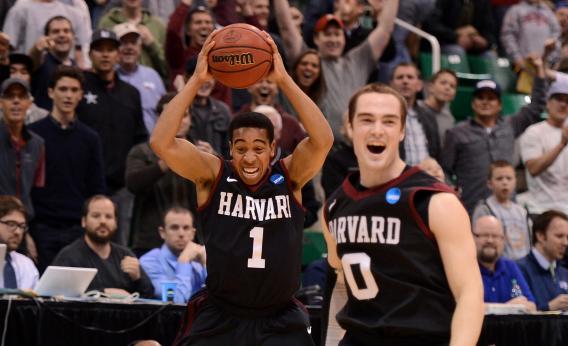
Five Men of Harvard…

Haunting the Web Since 1999

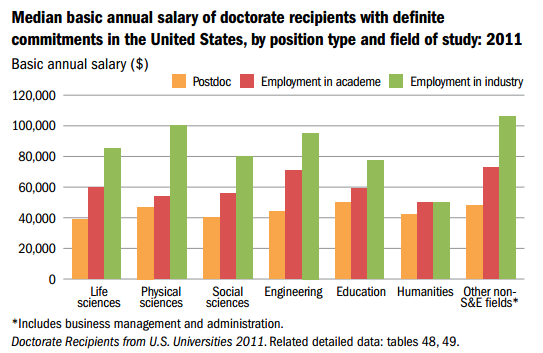
The Atlantic‘s Jordan Weissman takes another gander at the sorry state of the PhD life in America, with an emphasis on the sciences. “The pattern reaching back to 2001 is clear — fewer jobs, more unemployment, and more post-doc work — especially in the sciences. A post doc essentially translates into toiling as a low-paid lab hand.”
Note also the dismal situation of the humanities in the graph below. The average salary for a humanities PhD is not only less than I’m making in speechwriting these days — it’s less than what I was making in 2001, before I went off for grad school. It’s also less, or at the very least comparable, to the average salary of a public school teacher in America — a job where you’re probably much more likely to make a difference in the lives of your students. But hey, check out the big brain on me.
The upshot here, at least for the humanities? It’s generally a bad idea to spend a decade apprenticing yourself to a job that barely even exists anymore.
Update: “Let me start with the bad news. It is not even news anymore; it is simply bad. Graduate education in the humanities is in crisis. Every aspect, from the most specific details of the curriculum to the broadest questions about its purpose, is in crisis. It is a seamless garment of crisis: If you pull on any one thread, the entire thing unravels.” Literature professor Michael Bérubé surveys the sad state of affairs in the Chronicle of Higher Education.
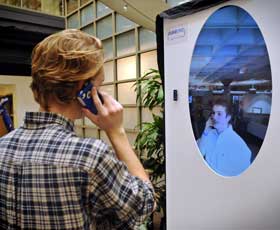
“‘The whole era,’ concluded Bourne in disgust, ‘has been spiritually wasted.’” Let’s hope, down the road a-ways from 2012, the last few years won’t feel the same. Anyway, that line’s from the first paragraph of the now completed(!) dissertation, which I sent off to my advisor and the committee this afternoon. It’s been a very long road, and I’m sure the euphoria will take hold in a bit. As for now, I just feel as per the clip above — plus exhausted with a twinge of Comic Guy.
FWIW, the final draft, with footnotes and bibliography and all that, clocked in at 1269 pages. If anyone’s interested on what’s covered and the general layout, I posted the table of contents below. That is obviously far too long for public — or anyone’s — consumption. I mean, I wrote the damned thing and I only read, like, the conclusion and stuff…It’s about the 20’s, right?
Seriously though, I’m sure I could have condensed it more than I did. For example, here’s the part on p. 527 where I talk about how the Harding administration used the Herrin Massacre as a public relations coup against the labor movement in 1922:
“All work and no play makes Kevin a boring boy. All work and no play makes Kevin a boring boy. All work and no play makes Kevin a boring boy. All work and no play makes Kevin a boring boy. All work and no play makes Kevin a boring boy. All work and no play makes Kevin a boring boy. All work and no play makes Kevin a boring boy. All work and no play makes Kevin a boring boy. All work and no play makes Kevin a boring boy. All work and no play makes Kevin a boring boy. All work and no play makes Kevin a boring boy.“
That goes on for about 70 pages. And I think, if I’d just worked at it a little harder, I could’ve really gotten that down to 40. Ohhhhh well.
At any rate, I’m way too tired to be blogging at the moment, so I’ll leave it at that for now. Thanks to everyone for putting up with all the navel-gazing posts about this over the past few weeks, months, and years. FWIW, the general GitM readership got a shout-out on the acknowledgments page. With that in mind, work is crazy through election day, but this site should hopefully resume to normal status updates soon thereafter. First I need to sleep for awhile, clean up my paper-, book-, and dog-hair-strewn apartment, do some more sleeping, see all the movies I’ve missed — the only one I’ve seen in months was Looper (I liked it) — take my man Berk to the park, sleep some more, get a life, stuff like that.
Also, there is still the actual defense to consider, which will happen sometime in the next two months. But I am assuming that today was the day I destroyed the Ring, and that will be more of an “I’m a scarred, melancholy badass now, so let’s kick Saruman out of the Shire” Scouring-level event. Also, I’m not counting any chickens, trust me, but I did go ahead and put the batteries in my brand-new sonic screwdriver.

Uphill All The Way: The Fortunes of Progressivism 1919-1929
ACKNOWLEDGEMENTS v
DEDICATION ix
PREFACE x
INTRODUCTION 1
CHAPTER ONE: THE “TRAGEDY OF THE PEACE MESSIAH” 31
CHAPTER FIVE: THE POLITICS OF NORMALCY 357
CHAPTER NINE: THE BUSINESS OF AMERICA 824

“At latest count, we have 1.5 million university professors in this country, 1 million of whom are adjuncts. One million professors in America are hired on short-term contracts, most often for one semester at a time, with no job security whatsoever – which means that they have no idea how much work they will have in any given semester, and that they are often completely unemployed over summer months when work is nearly impossible to find (and many of the unemployed adjuncts do not qualify for unemployment payments). So, one million American university professors are earning, on average, $20K a year gross, with no benefits or healthcare, no unemployment insurance when they are out of work. Keep in mind, too, that many of the more recent Ph.Ds have entered this field often with the burden of six figure student loan debt on their backs.“
By way a history friend, How the American University was Killed in Five Easy Steps. (Hint: It has to do with the Powell Memo.) I’m finishing up my PhD because I’m pot-committed at this point but, when anyone asks, I never recommend that they follow suit. It is UGLY out there. When the chips were down, I was fortunate enough to have a prior career in speechwriting to fall back on. Most people don’t have that luxury.

A decade after attempting to secure fifteen minutes of fame, amateur historian Thomas Lowry is caught tampering with original Lincoln documents: He made it seem Lincoln’s last official act was pardoning a Union deserter named Patrick Murphy, actually pardoned in 1864. “Lowry’s purported discovery was hailed by historians when he came forward in 1998. At the time, a Civil War expert with the Archives said Lowry had made ‘a unique and substantial contribution to Lincoln research and to the study of the Civil War.’”
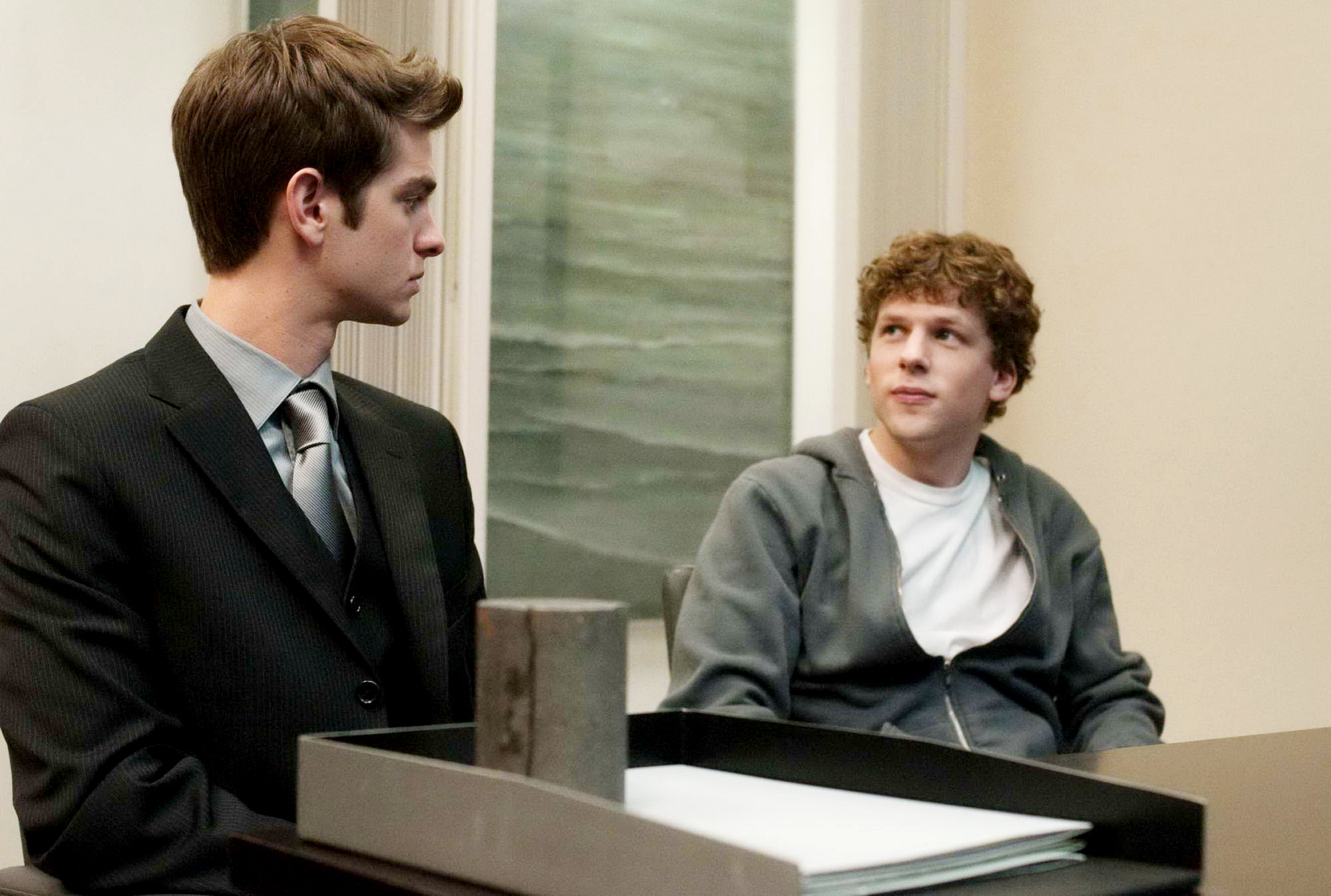
Suffice to say, this movie is a lot like its protagonist — fast-talking, occasionally irritating, oftentimes more clever than it is smart, and ultimately endearing despite itself. In all honesty, The Social Network irked me quite a bit in the early going, but it also managed to win me back by the closing credits. The highest praise I can give Fincher’s film in the end is that I enjoyed it, would recommend it, and look forward to seeing it again, even despite the fact that, when it came to any aspect of the story I actually knew anything about, the movie was often aggravatingly, woefully wrong.
First, the story. The Social Network begins with a very Aaron Sorkin-y dispute at a bar between Erica, an attractive young BU co-ed (Rooney Mara, soon to be Fincher’s Lisabeth Salander), and Mark, her geeky-arrogant Harvard boyfriend (Jesse Eisenberg, here making a bold move to outflank his actorly nemesis, Michael Cera). For some reason, Mark is seriously sweating what Finals Club — a.k.a. the old-school, Harvard version of the fraternity scene — he might end up in, so much so that he eventually lets his disdain for his girlfriend slip out. (“Why do you keep saying I don’t need to study?” “You go to BU!“) And so Erica wisely walks out of the picture, leaving Mark stewing in the cauldron of feminine slight, status anxiety, and nerd-rage from which, presumably, world-conquering social websites are eventually born.
Having introduced Mr. Zuckerberg and his general unpleasantness, The Social Network proceeds to tell his story. How, after bad-mouthing Erica on his blog (First rule of blogging: Don’t drink and blog), he embarks on a plan of revenge against all of womanhood by coding up a Harvard “Hot or Not” knockoff called Facemash. How this stunt gains him both notoriety on campus and the attention of Tyler and Cameron Winklevoss (both Armie Hammer), a pair of Old Money, Olympian-class rowing twins — and members of the Porcellian! — who need a coder for their website idea, “The Harvard Connection.” And how Mark, along with his kind-hearted (and wealthier) best friend Eduardo (Andrew Garfield, the heart of the film), may or may not steal their idea to create his own social portal, “The Facebook”– which, as we all know, eventually leads to mo’ money, mo’ problems, as a wise man once put it.
This origin story is smoothly told throughout — remarkably so, in fact. The action cuts back and forth between the shenanigans taking place at Harvard and, eventually, Silicon Valley (Enter Justin Timberlake, playing an outsized, Faustian version of Napster’s Sean Parker) and, after the millions have been made, two grim depositions: Mark is being sued separately by Eduardo and the Winklevoss twins, who he memorably dubs the “Winklevi.” And throughout, it’s hard not to appreciate how relentlessly smart the movie is. In the early going, to establish Mark’s coding prowess, there’s even an admirable attempt to explain the basics of how he puts together Facesmash: “First up is Kirkland. They keep everything open and allow indexes in their Apache configuration, so a little WGET magic is all that’s necessary to download the entire Kirkland facebook. Kids’ stuff.”
So what’s the problem? Well, I’m not a coder by any means, and I definitely wasn’t present at the birth of Facebook. But I did go to Harvard, spent more than a few hours in the crew tanks, own and have rocked the Henley jacket, and have cooled my heels in the Porc’s bike room before. And when it comes to the alma mater, the film is severely off by at least three or four decades. The Harvard of The Social Network is pre-meritocratic — It looks right but feels totally wrong. Really, who cares about Finals Clubs anymore? Slate‘s Nathan Heller already eviscerated the movie on his front, and he’s absolutely right: “I recognized their Harvard, but only from Love Story and The Paper Chase, not my experience. To get the university this wrong in this movie is no small matter.”
And so a lot of the The Social Network just felt ludicrous to me. Early on, they try to portray a party at the Phoenix, one of the Finals Clubs (in my day, probably the most ethnically diverse and least douchey of them, to boot), as the very pinnacle of exclusivity, where the beautiful people party. In the film, attractive, revealingly-dressed women bus in from all over Boston to see if they can get past the rope line. In reality, parties at the Phoenix were…well, college frat parties. The very fact that I got drunk at them occasionally doesn’t speak highly of either their exclusivity or their beautifulness. In other words, Finals Clubs are kinda sad and desiccated these days. They were glorified frats, and nobody took them at all seriously — not even the private school kids who might have a vested interest in keeping up the old appearances.
That is just one example, but it happens over and over again in The Social Network. That aforementioned sinister-seeming bus of farmed-in party girls — well, Cambridge folk know that’s the “F**k Truck”, and it was just a bus route, no more, no less. I was a regular on it for months when dating a woman out in Wellesley. But it seems like Sorkin heard the nickname and went wild with it. There’s another scene where Eduardo and others are hazed about “the Statue of the Three Lies, and some frosh flubs it wildly. But the three lies are Firstyear 101. Everyone knows ’em, and there’s no way a kid, however wasted, would blank out like that. The whole scene just seems inserted in to show off Sorkin’s Harvard research.
And don’t get me started on the crew stuff. On one hand, it’s a real kick to see the sport get some props here — One scene, set to a Reznorized version of “Hall of the Mountain King”, even shows the Winklevi competing at Henley. (Not much love for coxswains, alas.) But then the Wonder Twins meet “His Royal Highness,” the Prince of Monaco (as a friend pointed out, it’s His Serene Highness.”) And, when said prince says it’s the closest race he’s seen in 30 years, Tyler replies: “[M]ile and a half races are more commonly won by a boat length or two.” Uh, no, races come to within a few seats, or even a few bowballs, all the time. And Henley is actually a 1.3 mile race, and one that rowers would normally talk about in meters — here, 2112 — in any case.
FWIW, this inattention to detail is a recurring problem I have with Aaron Sorkin’s output — The West Wing, a show which I know is much-beloved, also had more than its fair share of aggravating errors. (To take just one example, I remember President Martin Sheen complaining in the last episode about the Founders picking the cold month of January for inauguration day. They didn’t.) And in both The West Wing and here in The Social Network, every single character speaks in exactly the same hyper-clever, overwritten voice, and that over-writing, to my mind, generally tends to be fast and sloppy (Or, to be uncharitable about it, coked out.)
Are these quibbles? Well, maybe, but they add up, and I eventually thought the minor-but-accumulating errors of truth hamstrung the overall truthiness of the project. If Harvard isn’t actually a citadel reigned over by bluebloods and subdivided into all-important Finals Club fiefdoms (and it isn’t), then the Match Point-esque status anxiety driving Zuckerberg here isn’t at all convincing.
Or, to take another problem: At the time this story begins, in the fall of 2003, I was in New York and dating someone I’d met on Friendster. But you don’t get any sense from this story that Friendster, or MySpace, or even the Columbia Campus Network were already well-established by the time Facebook was concocted.
The point being, the entire movie is constructed as if Zuckerberg et al are fighting over this ground-breaking and wonderful new idea. But, as Larry Lessig pointed out in TNR: By 2003, the idea of a social network was really nothing new at all. The origin of Facebook is really a story about execution: As Lessig writes, “In interviews given after making the film, Sorkin boasts about his ignorance of the Internet. That ignorance shows.”
In an effort to make the Facebook idea seem unique, Sorkin & Fincher argue here that it’s the site’s exclusivity that makes it something altogether new. Really? I don’t buy that, particularly when the worries about exclusivity theoretically driving Zuckerberg here ring so false. Don’t get me wrong — I liked The Social Network, and I had a lot of fun watching it. But, while Fincher’s film may be a very entertaining whirlwind tour through the stately pleasure domes of Harvard and the Bay, it’s also aggravatingly lacking in veritas in ways both great and small. I’d friend The Social Network, sure, but unfortunately it’s not the all-time classic that the online hype suggested.
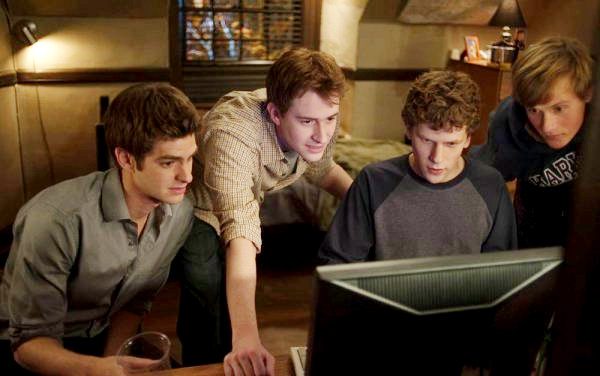
After a few audio-only teasers, David Fincher releases a wonderfully melancholy trailer for The Social Network, with Jesse Eisenberg, Justin Timberlake, Andrew Garfield, Joseph Mazzello, Armie Hammer, and Rashida Jones.
I was definitely catching this film anyway. But, I gotta say, this clip really brought to mind in a visceral way the old college days, and not just due to that mournful, nostalgia-inducing Radiohead cover and the presence of my old ’97 classmate Rashida. The crew tank, the Henley jackets, the Weeks footbridge, the Finals Club prepsters, the scullers, the dorm fireplaces, low ceilings, and cruddy furniture, that muted, wintry, wood-panelly palette…Even more than movies like Love Story or the egregious With Honors, this clip just looks and feels like those Cambridge days of yore (even if, in my era, we were still well on the far side of Friendster.)
“Each academic becomes the trustee not of a branch of the sciences, but of limited knowledge that all too often is irrelevant for genuinely important problems. A colleague recently boasted to me that his best student was doing his dissertation on how the medieval theologian Duns Scotus used citations.” In the NYT, Mark Taylor, the chair of Columbia’s religion department, reads the writing on the wall and calls for a complete overhaul of graduate school education in America. “Graduate education is the Detroit of higher learning. Most graduate programs in American universities produce a product for which there is no market (candidates for teaching positions that do not exist) and develop skills for which there is diminishing demand (research in subfields within subfields and publication in journals read by no one other than a few like-minded colleagues), all at a rapidly rising cost (sometimes well over $100,000 in student loans).” Ya, sounds about right.
“Fulltime faculty jobs have not been easy to come by in recent decades, but this year the new crop of Ph.D. candidates is finding the prospects worse than ever. Public universities are bracing for severe cuts as state legislatures grapple with yawning deficits. At the same time, even the wealthiest private colleges have seen their endowments sink and donations slacken since the financial crisis.” Following in the footsteps of the Chronicle of Higher Education and various academic blogs, the NYT delves into the horrible job prospects for newly-minted humanities PhDs these days. “‘This is a year of no jobs,’ said Catherine Stimpson, the dean of the Graduate School of Arts and Sciences at New York University. Ph.D.s are stacked up, she said, ‘like planes hovering over La Guardia.’“
Even before the downturn, it was clear to me and my cohort that, even coming out of a prestigious Ivy, our prospects for a remunerative and rewarding academic job in the Age of Adjuncts was rather slim. The historical analogy I liked to use then to describe our situation: It’s 1840 and, after years of apprenticeship, we can all make really nice, quality, hand-crafted shoes. But, you know what? They’ve got factories that make those now, for much, much cheaper.
And now, in this economy? Heh. The TLDR version for all of these links, courtesy of Marge Simpson: “Bart, don’t make fun of grad students. They just made a terrible life choice.“